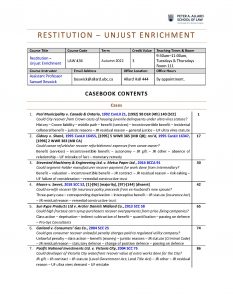LAW 436 Course Description
The law of obligations concerns the legal rights and duties owed between people. Three primary categories make up the common law of obligations: tort (wrongs), contract (agreements), and unjust enrichment (unjustified gains). The law of unjust enrichment steps in when transactions go awry—when a defendant gains a benefit to the detriment of a plaintiff, and “there is no reason in law or justice for the defendant’s retention of the benefit conferred by the plaintiff” (Kerr v. Baranow, 2011 SCC 10, [2011] 1 SCR 269, [40]). Restitution—reversing the transaction—is the typical response to unjust enrichment.
This third category of the law of obligations is significant to all sorts of civil disputes—especially in the areas of mistaken payments or benefits, the division of family property, and failed commercial transactions. It is rapidly being developed in contemporary case law and scholarship. Yet, the law of unjust enrichment and restitution is often overlooked and misunderstood by lawyers. The objective of this course is to provide students with an understanding of the essential legal doctrine and controversies as they exist both in the classroom and courtroom.
Learning Objectives
- Understand and apply the fundamental doctrine and concepts that underpin Canada’s modern unjust enrichment framework.
- Understand the core controversies and difficulties within the law of unjust enrichment today.
Resources
- Casebook contents (Autumn 2022).
- Syllabus (Autumn 2022).
- Introductory slides (Spring 2021).
- Exam (Spring 2021).
Related Scholarship
- “Strike-Out Appeals, Unjust Enrichment, and Discoverability: Insights from Kenya” (2022) 51 Common Law World Review 12.
- “Unjust Enrichment: Principle or Cause of Action?” Restitution 2021 (Vancouver: CLEBC, 2021).
- “The Overpaid Tax Litigation: Roadblocked” (2021) 84 Modern Law Review 1105.